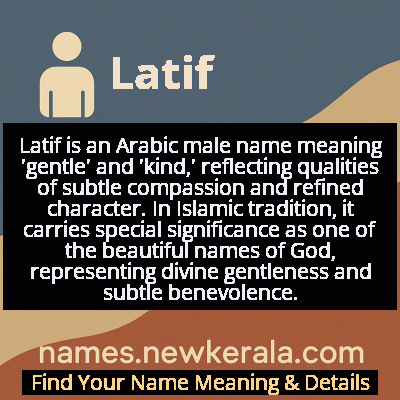Latif Name Meaning & Details
Origin, Popularity, Numerology Analysis & Name Meaning of Latif
Discover the origin, meaning, and cultural significance of the name LATIF. Delve into its historical roots and explore the lasting impact it has had on communities and traditions.
Name
Latif
Gender
Male
Origin
Muslim
Lucky Number
3
Meaning of the Name - Latif
Latif is an Arabic male name meaning 'gentle' and 'kind,' reflecting qualities of subtle compassion and refined character. In Islamic tradition, it carries special significance as one of the beautiful names of God, representing divine gentleness and subtle benevolence.
Latif - Complete Numerology Analysis
Your Numerology Number
Based on Pythagorean Numerology System
Ruling Planet
Jupiter
Positive Nature
Optimistic, inspirational, and creative.
Negative Traits
Scattered, exaggerating.
Lucky Colours
Yellow, gold, purple.
Lucky Days
Thursday.
Lucky Stones
Yellow sapphire.
Harmony Numbers
1, 2, 9.
Best Suited Professions
Arts, writing, communication.
What People Like About You
Creativity, optimism.
Famous People Named Latif
Abdul Latif
Scholar and Reformer
Pioneer of Muslim renaissance in Bengal, founder of Muhammadan Literary Society
Latif Yahia
Author and Former Military Officer
Known as 'Saddam Hussein's double' and author of controversial books about his experiences
Latif Bolat
Musician and Scholar
Renowned Turkish Sufi musician and researcher of Turkish folk traditions
Latif Nasser
Science Historian and Radio Host
Host of Netflix's 'Connected' and research director at Radiolab
Name Variations & International Equivalents
Click on blue names to explore their detailed meanings. Gray names with will be available soon.
Cultural & Historical Significance
Throughout Islamic history, the name has been borne by scholars, mystics, and leaders who exemplified these qualities, making it a popular choice for parents seeking to instill spiritual values in their children. In Sufi traditions particularly, the concept of 'Lutf' (divine grace) is central to spiritual development, further enhancing the name's religious significance across diverse Muslim communities from the Middle East to Southeast Asia. The name serves as a constant reminder of the Islamic virtues of compassion, subtlety, and refined character in daily life.
Extended Personality Analysis
Individuals named Latif are typically perceived as gentle, compassionate, and emotionally intelligent. They often possess a natural ability to understand subtle emotional cues and navigate complex social situations with grace and diplomacy. Their kindness is not merely superficial but stems from a deep-seated empathy that allows them to connect with others on an authentic level. Latifs tend to be excellent listeners who offer thoughtful advice rather than quick judgments, making them trusted confidants and mediators in both personal and professional contexts.
They often exhibit artistic sensibilities and appreciate beauty in its various forms, whether in art, nature, or human relationships. While gentle in demeanor, they can demonstrate remarkable inner strength and resilience when facing challenges, often using subtle persuasion rather than confrontation to achieve their goals. Their approach to problem-solving tends to be creative and nuanced, preferring harmony over conflict and understanding over judgment. This combination of emotional intelligence and quiet determination makes them effective in leadership roles that require diplomatic skills and genuine care for others' wellbeing.
Modern Usage & Popularity
In contemporary times, Latif remains a popular name across the Muslim world, though its usage patterns vary regionally. In Arabic-speaking countries, it maintains steady popularity as both a first name and part of compound names like Abdul-Latif. In South Asia, the variant 'Lateef' is more common and continues to be widely used. The name has seen some internationalization, with notable bearers in Western countries contributing to its global recognition. While not among the most trending modern names, it holds a classic appeal for parents seeking traditional Islamic names with profound spiritual meaning. Recent years have seen some decline in urban centers in favor of more contemporary names, but it remains strong in religiously conservative communities and among families valuing traditional Islamic nomenclature. The name's positive connotations of gentleness and kindness align well with modern parenting values emphasizing emotional intelligence and compassion.
Symbolic & Spiritual Meanings
Symbolically, Latif represents the concept of subtle grace and refined benevolence in human character. It embodies the idea that true strength lies in gentleness and that the most profound influences often come through subtle, almost imperceptible means rather than overt force. The name symbolizes the Islamic principle that divine guidance and human kindness operate through delicate channels that respect individual autonomy and dignity. Metaphorically, it suggests the gentle breeze that brings relief without demand, the subtle hint that guides without coercion, and the quiet strength that supports without dominating. In spiritual contexts, it represents the divine attribute that works through the finest details of existence, arranging circumstances with subtle wisdom beyond human comprehension. The name carries the symbolism of water—fluid, gentle, yet capable of shaping the hardest stone through persistent kindness and gradual influence.

